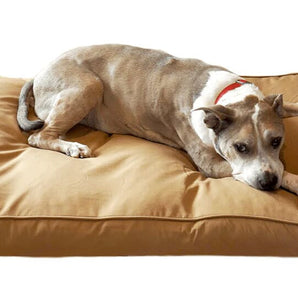Yes, dogs can eat tomatoes, but only the ripe red ones and only in moderation. The green parts of the tomato plant (like the stems, leaves, and unripe fruit) are toxic to dogs because they contain solanine and tomatine. So while a few small bites of ripe tomato can be a healthy treat, the rest of the plant should stay off your pup’s menu.
Are Tomatoes Safe for Dogs?
It’s totally normal for dog owners to wonder about human foods like tomatoes. After all, dogs always seem interested in what’s on our plates. So, can dogs eat tomatoes? The answer depends on the ripeness and preparation.
Ripe red tomatoes are generally safe for dogs to eat. They offer vitamins and antioxidants that can support your dog’s health when fed in small amounts. On the other hand, green tomatoes and any part of the tomato plant—leaves, stems, or vines—can cause toxic reactions.
As with all human foods, moderation is key. Tomatoes should be treated like an occasional snack, not a regular part of your dog’s diet.
And remember: a healthy diet and quality rest go hand in hand. A large breed dog needs a supportive, orthopedic bed like a Bully Bed to recharge properly after both playtime and mealtime.
The Safe Treat: Ripe, Red Tomatoes

When you choose ripe, red tomatoes, you’re picking the only safe part of the plant for your pup. Ripe tomatoes contain minimal solanine, making them safe for dogs in small amounts.
Here’s how to safely prepare them:
-
Wash the tomato thoroughly to remove pesticides or dirt.
-
Remove stems, leaves, and any green parts.
-
Cut the tomato into bite-sized pieces to avoid choking hazards.
-
Serve plain—no salt, oil, or seasoning.
Stick to fresh tomatoes rather than canned tomatoes, tomato sauce, or tomato soup, since those often contain toxic ingredients like onions, garlic, and excessive salt.
Tomatoes should complement your dog’s meals, not replace them. Balanced dog food provides the complete nutrition your pup needs, while tomatoes can be a fun and healthy treat every once in a while.
The Risk of Solanine and Toxic Parts
The main risk with tomatoes comes from solanine (and its close cousin, tomatine), natural toxins found in the nightshade family of plants. While ripe red tomatoes contain very low amounts, the green parts of the tomato plant are another story.
Avoid letting your dog near:
-
Green or unripe tomatoes (also called young green tomatoes)
-
Leaves, stems, or vines of the tomato plant
-
Tomato plants growing in your garden
Even a small nibble on the wrong part of the plant can cause digestive upset or more serious symptoms.
Also, avoid processed tomato-based foods such as tomato sauces, pasta sauce, ketchup, and canned tomato soup. These often contain added sugar, salt, onions, or garlic, which can be toxic to dogs and lead to salt poisoning or gastrointestinal issues.
If you grow tomatoes in your yard, keep them fenced off or use raised planters to prevent your dog from snacking on the plants.
Nutritional Value and Health Benefits of Tomatoes as Dog Treats
So, what makes ripe tomatoes good for dogs in small quantities? The nutritional benefits are real, as long as you stick to safe portions and the ripe fruit only.
Key nutrients in ripe tomatoes:
-
Vitamin C: Supports immune health and helps reduce inflammation.
-
Vitamin K: Important for bone strength and blood health.
-
Fiber: Aids digestion and promotes bowel regularity.
-
Beta carotene and lycopene: Antioxidants that help protect against cell damage and may promote heart health.
These nutrients give tomatoes their many health benefits, especially when served as part of a balanced diet. Just like humans, dogs need a variety of nutrients to stay healthy.
If your dog struggles with tummy troubles, consider supporting their digestive health with supplements like Bully Beds’ Probiotic Enzymes Soft Chews for Digestive Health. They work great alongside a balanced diet and safe snacks like fresh tomatoes.
Recognizing Solanine Poisoning
Even though most dogs can eat ripe tomatoes safely, it’s important to recognize the signs of tomato poisoning (or tomatine poisoning), especially if your dog gets into green tomatoes or the tomato plant itself.
Watch for these symptoms:
-
Vomiting or diarrhea
-
Weakness or lethargy
-
Tremors or muscle twitching
-
Loss of coordination
-
Dilated pupils
-
Seizures (in severe cases)
If you notice any of these signs, contact your veterinarian or Pet Poison Helpline right away. Don’t wait for symptoms to worsen; early intervention can make a huge difference in your dog’s recovery.
Safe Feeding Practices and Garden Prevention
Introducing any new food to your dog’s diet should always be gradual. Start with a small piece of ripe tomato and observe your dog for allergic reactions, digestive upset, or other adverse reactions.
Tips for safe feeding:
-
Offer tomatoes as an occasional treat, not a regular snack.
-
Avoid feeding tomatoes to puppies or dogs with sensitive stomachs or preexisting health conditions.
-
Limit tomato-based foods entirely. Never let dogs eat tomato sauce, ketchup, or canned tomatoes due to toxic ingredients like garlic or excessive salt.
If you grow tomato plants at home, consider adding fencing or raised planters to prevent accidental snacking. Dogs are curious by nature, and those vines can be tempting.
If your dog tends to chew on plants, redirect that behavior with safe alternatives—like chew toys or a Bully Beds Chew Proof Dog Bed that can handle even the toughest jaws. Keeping them mentally stimulated and properly rested reduces destructive chewing and helps protect your furniture (and your garden).
Safe Vegetable Alternatives
If you want to expand your dog’s menu with dog-safe vegetables, here are a few great options to try instead of tomatoes:
-
Carrots
-
Green beans
-
Cucumber slices
-
Broccoli (in small amounts)
-
Sweet potatoes (cooked and plain)
Each of these offers valuable nutritional benefits without the risks associated with unripe tomatoes or tomato plants.
FAQs About Dogs and Tomatoes

Can dogs eat cherry tomatoes?
Yes, dogs can eat cherry tomatoes as long as they are ripe and red. Cut them into small pieces to reduce the choking hazard and feed in moderation.
Can dogs eat canned tomatoes?
No. Canned tomatoes often contain added salt or preservatives that are toxic to dogs. Stick with fresh tomatoes only.
Can dogs eat tomato sauce?
No, dogs should not eat tomato sauce. Most tomato sauces and pasta sauces contain toxic ingredients like garlic, onion, salt, and sugar, which can upset your dog’s stomach or even lead to salt poisoning. Even small amounts can be harmful, especially for small dogs or those with existing health conditions.
Can dogs eat tomato soup or tomato juice?
No. Tomato soup, juice, and sauces usually contain onion, garlic, or excess sodium, which are unsafe for dogs.
Can dogs eat ketchup?
No, dogs should not eat ketchup. While it might seem harmless, most ketchup brands contain added sugar, salt, and spices like onion or garlic powder, all of which are toxic to dogs.
Can puppies eat tomatoes?
It’s best to avoid feeding tomatoes to puppies. Their digestive systems are still developing, and they are more prone to digestive upset.
What should I do if my dog eats green tomatoes or tomato leaves?
Monitor for signs of tomato poisoning like vomiting or muscle tremors, and contact your vet or the Pet Poison Helpline immediately.
So, Are Tomatoes Bad For Dogs?
The answer is yes—but with conditions. Ripe, red tomatoes are generally safe for dogs in small amounts and can offer some health benefits. However, green parts, unripe fruit, and tomato-based foods should always be avoided because they can be toxic to dogs.
Remember, moderation matters. A few small pieces of fresh tomatoes make a healthy, hydrating occasional snack, but too many tomatoes or the wrong kind can upset your dog’s stomach.
As always, consult your veterinarian before adding any new foods to your dog’s diet. And once your pup’s tummy is happy and healthy, make sure they’re getting the restorative rest they deserve on a durable, supportive Bully Bed built for big dogs.





